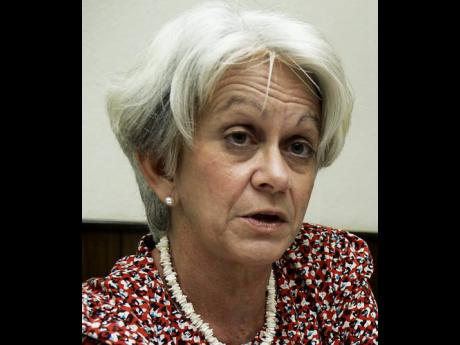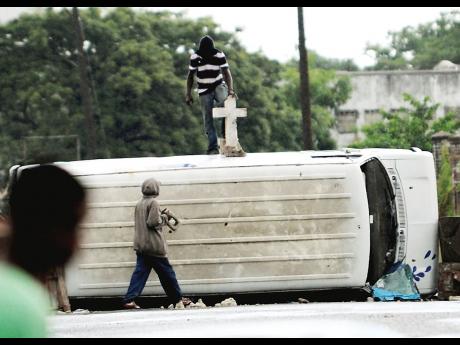Gangsters’ pawns - Lured into a life of crime at 14, a former 'shotta' bares his soul
They are the pawns of Jamaica's organised crime syndicates. Teenage boys, some as young as 14 years old, are increasingly being lured into criminal gangs.
"The dons use these youths in the initial stages because most of these youths are not known to the police. So the dons use them because they are more difficult to track," said Assistant Commissioner of Police Derrick 'Cowboy' Knight, who has spent many years tackling young gangsters.
"They use them in crimes such as shootings, murders, and, importantly, the collection of extortion [money], which is very rampant in most of these inner-city communities," added Knight.
According to Knight, most of these youths are wayward, of poor parentage and are easily manipulated by members of organised criminal networks.
One youngster recruited by gangsters was Mark*, who grew up in one of the most violent communities in the Corporate Area.
Now 27, Mark knows that he is lucky to be alive, after teenage years filled with murder and mayhem.
At the time Mark was recruited into the gang, grown men in the community encouraged boys to shoot openly at police. The boys were taught how to murder a man execution style, and how to 'clean up' a body to prevent it from giving off an odour quickly after it was dumped.
REWARDED FOR DEEDS
According to Mark, the adult gangsters celebrated the youngsters' feats with expensive gifts, vehicles and other luxuries, brainwashing the youths with a faÁade of a brotherly love.
For him, it started at grade six in primary school, when he found an illegal gun discarded inside his yard by a man fleeing from the police. That gun earned him respect among the area gangsters, who would soon find use for his brazenness, having learnt that he hid the weapon - a Beretta - for more than a week.
"That was the first exposure. That just put me out there. From there, man have dem eye on me and look out for me certain way," Mark related.
At the time, he was living with three other siblings under the care of his mother, who could not take care of Mark, his brother and two sisters. So when the don started sending envelopes loaded with crisp $1,000 bills, it provided more than dinner - it made Mark feel "like a man, like a king, like mi could a do anything".
At 15, Mark was skipping school to hang out with the neighbourhood thugs. He was making extra money from ganja and cocaine sales, and sometimes just by being around the thugs. At other times, he would "lock" (hide) the gangsters' guns, a task he enjoyed as he would often take the weapons to school and show them off.
As he spoke to The Sunday Gleaner last Tuesday, Mark laughed, saying that at that time, he thought he would become rich from his criminal exploits.
"Back in the days, ... the bad man dem have all four bike. So from we a little boy, we see dem things deh and love dem things deh. Regular we juvenile a get we $5,000 and $6,000 send come to we inna we envelope," said Mark. "We don't know that don, but the bigger man dem would come wid our envelope with our name on it and say a the don send it."
That don was somewhere in the United States, said Mark. Only persons at the top of the gang spoke to him directly, and with one phone call, he could order up to 100 men to corral an enemy's yard - pistol men in the middle, while riflemen at the front and back of the gun mob.
UNNAMED GANG
Mark and his little unnamed gang of two teenage friends were at the bottom of the chain. They, like most young boys in the community, were woven into criminality incrementally by the thugs. Months after his gun find, Mark and his friends were contracted to dig a hole in which the thugs would bury a man who was to visit the community to purchase a gun.
The three boys toiled all night, digging the hole at a remote location in the community, and then the plan unfolded - the man was lured to the area, killed, then buried.
"From there, the don have we three juveniles as some serious youths who will do things," said Mark, explaining that soon he and his friends would be called to their "baptism" - a popular term in the criminal underworld for a gangster's first murder or "making his first duppy".
THINGS FALLING APART
But things started to fall apart for him quickly. By age 16, while many of his friends were preparing for their Caribbean Examinations Council-administered exams, Mark was being hunted by the law.
First, he became known to the residents, who blamed him for almost every crime committed in the community. And then there was a botched murder attempt, from which one victim emerged to identify him on a parade. But it was a shoot-out with the police weeks earlier that landed him in jail.
"People always a call up people name, but dem (police) never have nothing concrete on me. Is the police shooting, when the police identify me later on, is that time it really start get bad," he said, adding that he and his friends began to sleep anywhere in their bid to escape the police's dragnets. However, he was held, luckily without a gun, and taken into custody.
Mark recalled spending weeks at Half-Way Tree Police Station before he was transferred to the Horizon Adult Remand Centre for 14 months as the case dragged on. Soon the victim of the attempted murder, who had pointed him out at an identification parade, stopped coming to court.
Then the policeman, who was shot in the vest, stopped coming also.
"I don't know what happened but the policeman stop come," said Mark, as he hinted that his don could have influenced that decision.
According to Mark, in detention, he was treated with respect as soon he was recognised as one of his don's 'soldiers'.
With the witnesses in both cases failing to show, Mark's charges were soon dismissed and he returned to the streets. But he returned to a community where the don and more than a dozen of his friends had been killed in different incidents.
Faced with that reality, Mark said he decided to walk away from a life of crime, even though he is fearful that, at any time, a former foe may be out to get him. According to Mark, his first goal is to find a job - with an employer who will not ask too much about his past.
*Name changed.



